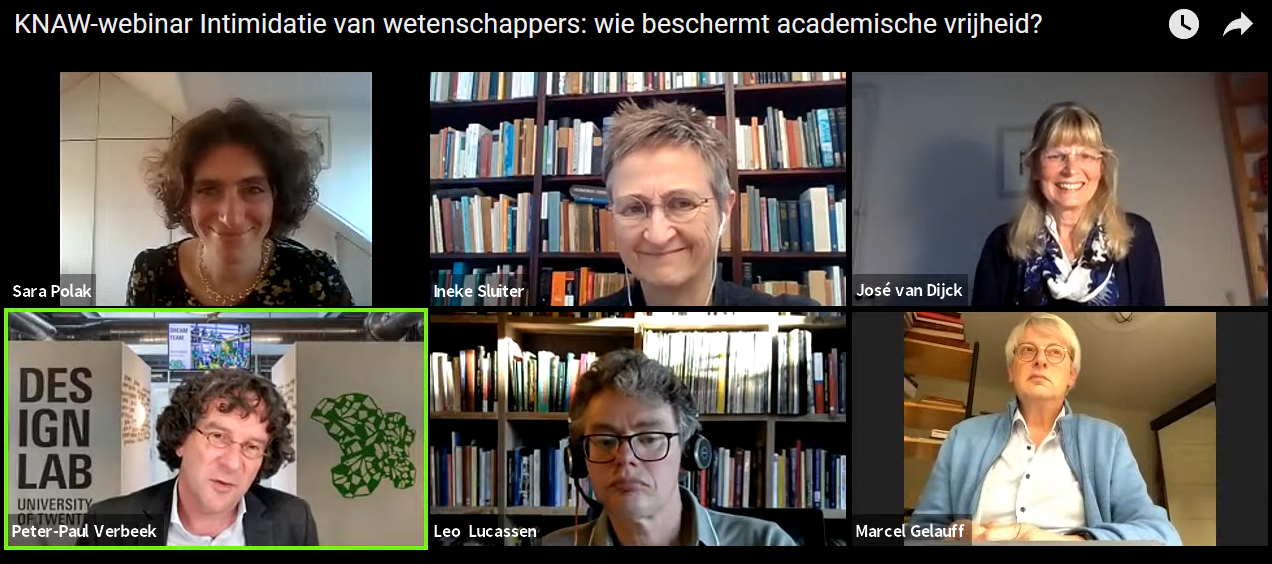Harassment debate: ‘It’s far worse for young academics and women’

Before the four speakers even started their presentations, KNAW president Ineke Sluiter thanked them and complimented them for their courage. “It feels really bad that I even have to say that”, she added. “This should not be necessary.”
Still, the topic of the evening – harassment against academics, both online and offline – was a sensitive one. Frequently discussed examples include the threatening stickers distributed by far right-wing platform Vizier Op Links (“Target the Left”) and the publication of Jaap van Dissel's home address online. He is of head of the National Institute for Public Health and the Environment (RIVM). This is not the first time the KNAW has addressed harassment: earlier this year, the organisation addressed the subject already in a report on academic freedom.
School playground
Sara Polak, teacher of American Studies in Leiden, admits she was hesitant about accepting the invitation to participate in the debate. “This story is being recorded, it’s going to appear on YouTube and it could easily haunt me for years to come.”
Polak, who has published a collection of essays about trolling on social media, describes Twitter as “one huge school playground with loads of bullies and where no rules apply”. In the academic Twitter arena, she believes that university administrators have a significant role to play, “in setting standards and enforcing them where necessary”. The same applies to deans and professors. “You are the designated trailblazers in that”.
She also provides some practical tips. For example, obvious as it may seem, think carefully about what you share on Twitter. “Ask yourself: would I print this tweet on a poster and hang it up in the university buildings?” And she warns administrators to be mindful that young academics without a permanent appointment are especially vulnerable. She therefore calls upon those in positions of responsibility to personally support staff who come under fire. “And by the way, that doesn’t mean just on Twitter.”
Quit Twitter
Marcel Gelauff, editor-in-chief of public-service news broadcaster NOS, was another one of the speakers invited. He sees many similarities between academia and journalism, where people also have to deal with threats, harassment, intimidation “and in some cases even worse”. Personally, he has already lodged seven official complaints with the police and has now quit Twitter.
Gelauff talked about PersVeilig (“PressSafe”), a project launched in collaboration with the police, the Public Prosecution Service and other agencies, to offer journalists information, training and a hotline on the subject. It is also raising awareness of the issue in the political arena. “I think that’s an illustration of the project’s success, however sad its existence may be.’’
Something similar might also work in the academic world, believes Peter-Paul Verbeek, distinguished professor of Philosophy of Technology at Twente. He was recently appointed to chair the first KNAW committee on the freedom of scientific practice.
Verbeek is disappointed that academics who make frequent media appearances are often looked down upon. “As if it’s the price you’re supposed to pay. That’s sometimes what you feel implicitly, all around you, and that’s really pernicious.”
Extreme misogyny
Leo Lucassen, professor of Global Labour and Migration History, declared he also has “an unbelievable amount of crap” thrown at him online every day. People say he is a “traitor to his country”, for example, or that he should be hanged.
He has already blocked hundreds of people on Twitter, which helps. Generally speaking, he can cope with the harassment, he said. But all that changed when Vizier Op Links posted pictures of his daughters online. “When it’s about your children, it comes very close to home.”
Like Polak, Lucassen realises that some academics are more vulnerable than others. “I'm a bit older, my position is secure and I’m a man. That makes a difference.” It’s far worse for young scientists and women, he stressed.
His female colleagues sometimes let him read what they receive in their inboxes. “On top of everything else, there’s a whole layer of extreme misogyny and sexism. On that point, I think extra attention is definitely needed.”
KNAW president Sluiter, one of the founders of campaign group Athena’s Angels, agrees. At moments like that, she says, female academics are stripped of all their qualifications, knowledge and expertise. “The only thing left is a woman who’s said something in public.”
Reporting crimes
One of the participants in the webinar wanted to know how universities support intimidated academics. Do they get in touch with the police? Are they planning to appoint security advisers?
A KNAW working group is drawing up an advice guide teaching people how to block someone on social media, for example. It also informs them about who to report a possible crime, and who they should take with them to the police station. As an employer, NOS boss Gelauff says he has already filed official complaints on behalf of members of his staff on several occasions. “Then my name appears in the system, not theirs. People are often afraid of that.”
More ideas along the same lines were brought up. Polak stressed that universities need to have a good infrastructure for handling complaints. Lucassen believes that young academics should be trained by their graduate schools in how to deal with media.
He also advises that, when invited onto a talk show, for example, people always check who they will be appearing with. For instance, he once declined a radio interview alongside populist politician Thierry Baudet. In cases like that, “It’s not about sharing knowledge. You have very little chance of really making your point, and you just give someone else a platform.”
Loud-mouthed minority
Finally, Lucassen points out, never forget that this all comes from a small but very loud minority. A much larger, but silent, majority actually appreciates science enormously. “So, whilst we do have to worry about this, we also need to see it in proportion.”